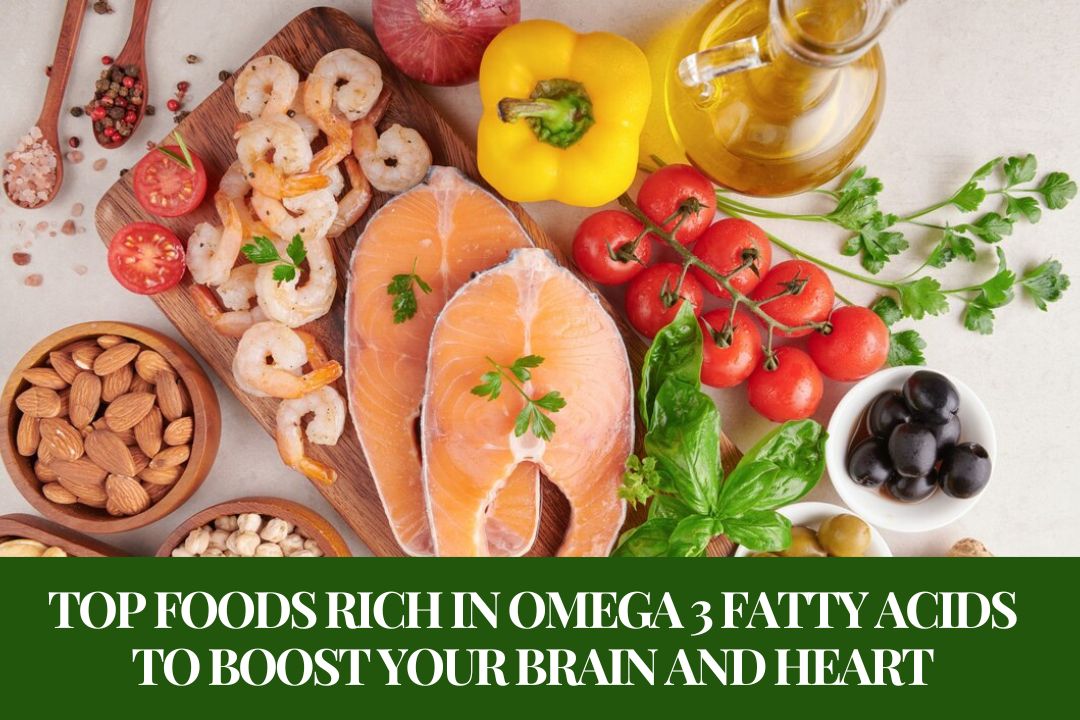The brain thrives on good fat, especially omega-3 fatty acids. Choosing the right omega-3 rich foods for brain health supports memory, sharpens focus, and helps prevent cognitive decline. These essential fats—especially DHA and EPA—form brain cell membranes, improve communication between neurons, and reduce inflammation. Whether from seafood or plants, these fats give your brain the fuel it needs to function at its best.

Why Omega-3s Are Crucial for the Brain
Your brain is nearly 60% fat, and omega-3 fatty acids make up a significant part of its structure. The most vital forms—DHA (docosahexaenoic acid) and EPA (eicosapentaenoic acid)—help maintain brain fluidity, enhance neurotransmitter function, and protect against oxidative stress.
Low levels of omega-3s often link to memory problems, mental fatigue, and mood disorders. Getting enough through food strengthens cognitive performance, improves mental clarity, and supports emotional balance. These fats also help reduce neuroinflammation, a major factor in aging and neurodegenerative conditions like Alzheimer’s disease.
Fatty Fish: The Gold Standard of Brain Food
Fatty fish rank highest on the list of omega-3 rich foods for brain health. They deliver both DHA and EPA in the most absorbable form. Top choices include:
- Salmon: Especially wild-caught, loaded with DHA
- Mackerel: Rich and oily, with brain-boosting benefits
- Sardines: Small, sustainable, and packed with EPA
- Anchovies: Great in small doses, ideal for salads
- Herring: A mild fish full of healthy fats
Eat at least two servings a week to maintain steady omega-3 intake. Pair fish with leafy greens or whole grains for a balanced, brain-supportive meal.
Plant-Based Omega-3 Sources
For vegetarians or those limiting seafood, plant sources offer ALA (alpha-linolenic acid)—a form of omega-3 that converts to DHA and EPA, though in smaller amounts. Include these in your diet:
- Chia seeds: High in ALA and fiber
- Flaxseeds: Best consumed ground for full absorption
- Walnuts: Support memory and reduce inflammation
- Hemp seeds: Offer a balance of omega-3 and omega-6
- Brussels sprouts: Cooked sprouts increase ALA content
While plant sources provide a lighter brain boost, regular intake still supports neural function, especially when combined with other brain-friendly foods.

Fortified Foods and Omega-3 Supplements
Modern diets often lack enough omega-3s, so fortified options help fill the gap. Look for:
- Omega-3 enriched eggs
- Plant-based milks with added DHA
- Yogurts, juices, and cereals containing microalgae oils
If your intake remains low, consider a quality omega-3 supplement. Options include:
- Fish oil capsules (for maximum EPA and DHA)
- Krill oil, which may absorb more efficiently
- Algal oil, a vegan-friendly DHA source
Supplements support brain health, especially if you’re dealing with stress, mental fog, or limited diet variety. Always choose third-party tested products for safety.
How Omega-3s Help with Focus and Mood
Besides memory, omega-3 fatty acids improve focus, reduce anxiety, and support emotional regulation. They influence the balance of dopamine and serotonin, which control motivation and mood.
Research links higher DHA intake with better attention span, especially in children and older adults. For people with depression, regular omega-3 consumption may ease symptoms naturally.
These healthy fats also protect the brain from stress-related damage by stabilizing cortisol levels. Think of omega-3s as emotional nutrition—they calm the mind while fueling cognitive sharpness.
Final Thoughts: Feed Your Brain What It Needs
Including omega-3 rich foods for brain health is one of the smartest choices you can make. From fish to flaxseeds, small changes lead to sharper thinking, steadier moods, and stronger memory. Eat well, think better—your brain deserves the best.
